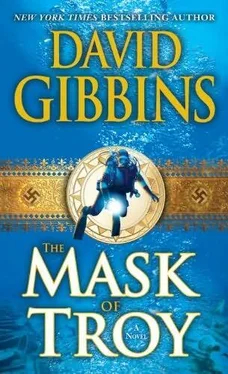David Gibbins - The Mask of Troy
Здесь есть возможность читать онлайн «David Gibbins - The Mask of Troy» весь текст электронной книги совершенно бесплатно (целиком полную версию без сокращений). В некоторых случаях можно слушать аудио, скачать через торрент в формате fb2 и присутствует краткое содержание. Жанр: Триллер, на английском языке. Описание произведения, (предисловие) а так же отзывы посетителей доступны на портале библиотеки ЛибКат.
- Название:The Mask of Troy
- Автор:
- Жанр:
- Год:неизвестен
- ISBN:нет данных
- Рейтинг книги:3 / 5. Голосов: 1
-
Избранное:Добавить в избранное
- Отзывы:
-
Ваша оценка:
- 60
- 1
- 2
- 3
- 4
- 5
The Mask of Troy: краткое содержание, описание и аннотация
Предлагаем к чтению аннотацию, описание, краткое содержание или предисловие (зависит от того, что написал сам автор книги «The Mask of Troy»). Если вы не нашли необходимую информацию о книге — напишите в комментариях, мы постараемся отыскать её.
The Mask of Troy — читать онлайн бесплатно полную книгу (весь текст) целиком
Ниже представлен текст книги, разбитый по страницам. Система сохранения места последней прочитанной страницы, позволяет с удобством читать онлайн бесплатно книгу «The Mask of Troy», без необходимости каждый раз заново искать на чём Вы остановились. Поставьте закладку, и сможете в любой момент перейти на страницу, на которой закончили чтение.
Интервал:
Закладка:
He needed to think fast. Mycenaean pottery had been found at Troy, but it was rare, probably highly prized. This cup could have been cargo, brought by a trader some time in the lead-up to the war, when Troy was a hub of commerce. But that must be wrong. These timbers were not those of a merchantman, but a galley. A war galley. The cup must have been the possession of someone on board. A crew member seemed unlikely, even the captain. They would have used bowls, ladles, to dip into the water vats, drinking their wine crudely, as sailors did. A cup like this would have been far too delicate for shipboard use. So it must have been a passenger. A Mycenaean noble, taking a galley to Troy? The Iliad showed that nobles, princes bent on war, took their prized possessions with them, the accoutrements for lavish feasting and wealth display. Princes bent on war. Jack knew where his thoughts were leading him, but he hardly dared go there. He wafted his hand over the bowl to reveal the rim, to see whether he could raise it in one piece. He waited for the sediment to settle.
Then he saw it.
First one letter, then another. A word, painted below the rim of the cup. A word in ancient Greek. He stared, transfixed, at the letter A toppled over on its side, the early Phoenician form of the letter, just as Dillen had shown him in the Ilioupersis. He could barely believe it. Letters in ancient Greek, on a Mycenaean cup from the thirteenth century BC. This proved it, beyond a shadow of a doubt. This showed that the Greeks of the late Bronze Age, of the age of heroes, had started to use the alphabet several centuries before anyone had previously thought, just as Dillen had argued. Jack’s mind was reeling. Dillen had been right about the Ilioupersis. It could have been written by a bard who actually witnessed the events of Troy. Jack was suddenly bursting to tell him. But there was more. As he deciphered the word, he gasped into his mouthpiece in astonishment. His mind raced back to all those hours spent with Dillen as a student. The Linear B syllabary – the script used by the Mycenaeans, the other script – had several words for leader, for king. One, basileus, the term used by Greeks of the classical period, was rarely encountered. Another, lawagetas, the most common term, meant chieftain, prince of one citadel, one city-state. In Homer’s Iliad, the men who led the contingent from their home territory, men like Achilles, Ajax, Nestor, would have been called that. But there was another word, a rarer one, the one staring Jack in the face now: wanax. That meant the ruler of many city-states, a paramount ruler, one elected in times of peril. The wanax was the biggest of them all, bigger than the greatest hero, a man whose power might rival that of the gods. A mighty wielder of the sceptre. A king of kings.
Jack reached down with his left hand and gently pushed his fingers into the sand around the stem of the cup, touching the pottery for the first time, feeling that wave of excitement that always coursed through him when he touched an artefact undisturbed by human hands for millennia. He remembered the sanctity of this place, the probability that the site was a war grave. A grave from two wars. But this cup deserved to be raised into the sunlight once again, to complete the voyage that was thwarted by catastrophe over three thousand years before, to be held aloft over the walls of Troy just as the great king would have done. Jack wanted to take it to where Dillen was excavating, to the highest bastion of the citadel overlooking the Plain of Ilion, so that they could share in the triumph of archaeology, revel in a find that not only gave Dillen proof that the Greek of the Ilioupersis was the Greek of Agamemnon, but also put them one huge step closer to the reality of the great king and his war to end all wars.
‘Jack.’ Costas’ voice crackled on the intercom. ‘Zero hour. Time to go home. Now.’
‘Roger that.’ Jack eased the ancient cup out of the sand and held it up, watching the sediment fall away in a silvery shower. It was intact, one of the most beautiful finds he had ever made. He blasted air into his buoyancy compensator and rose slowly above the sea bed, wreathed in a sheen of bubbles. His e-suit automatically bled air as the external pressure decreased, the computerized sensor maintaining his buoyancy just above neutral. He knew that the same was happening to the gas bubbles in his bloodstream, and he glanced at his wrist computer to double-check his ascent rate. He looked up at Costas, then back down at the wreck. The beam from his headlamp reflected off the particles stirred up where he had left the sea bed, and he switched it off, closing his eyes to help them adjust to the gloom. When he opened them a few moments later, he saw the clear outline of the minelayer, but now he imagined another wreck, the ancient ship underneath, twenty, maybe twenty-five metres in length, lying diagonally below the minelayer’s hull, its stern protruding through the smaller scour trench along the port side of the minelayer, its fore a few metres beyond where he had found the cup.
He stared at where he had been, straining his eyes. There was something else down there. Something was visible ahead of the spot where he had seen the planking, where he imagined the timbers tapering towards the galley’s bow. It would have been out of his line of vision from the scour trench, and on the sonar readout it would have looked like some broken-off structure from the minelayer. He pressed the buoyancy button on his suit to override the computer and manually expel air, and stopped dead in the water, staring downwards. There was no doubt about it. It was on exactly the right alignment, in exactly the right place, rising from the sand just beyond the outside edge of the scour trench. The prow of the ancient ship. It was a curved timber, but there was more shape to it than that. Was he seeing things? He was more than twenty metres above the sea bed now, and everything was receding. Suddenly he had a flashback to the famous stone gate of Mycenae, Agamemnon’s capital. Two lions, paws raised, facing a column. He stared again. Was that the shape? Was it the shape of a lion? A lion-prowed ship of Agamemnon? Or was his mind imprinting desire on to reality, playing the trick that had led so many before him up a blind alley in their search for the Trojan War?
‘Jack. You’re still at seventy metres. We’ll need to do a safety stop at thirty.’
Jack shut his eyes tightly, then opened them and reactivated the ascent programme. ‘Roger that. Just taking one last look.’
‘ Seaquest II ’s standing off, but Macalister’s sending a Zodiac. I can hear the outboard engines. I’m popping a buoy.’
‘Roger that.’ Jack watched the sea bed recede into dark blue, the jagged mass of the shipwreck disappearing into the gloom. He looked up, holding the cup now in both hands as a king might once have done, a great king toasting his heroes, Achilles and Ajax and Patroclus and the others. The shape of the cup was framed by a halo of light on the surface of the sea, just as Jack imagined it once being backlit by the sunshine of a brooding sky, etched in the eye of a king who was to lead a thousand ships to Troy. Could it really be? He felt a tremble go through him, and the cup suddenly seemed impossibly delicate, a phantasm from history, like a floating leaf that would disintegrate on touch. He remembered his dream, on the deck of Seaquest II that morning. Then, it had been a sword. But that was just a dream. Now he was no longer the archaeologist, but holding it as Agamemnon might have done. This was real. He saw Costas a few metres above him, staring, and pressed his intercom. ‘You’re not going to believe what I’ve found.’
‘Jack goes silent at the end of the first dive on a new wreck, and disappears into a hole in the sea bed? I guessed something was up. I can see what you’ve got. Looks pretty incredible.’
Читать дальшеИнтервал:
Закладка:
Похожие книги на «The Mask of Troy»
Представляем Вашему вниманию похожие книги на «The Mask of Troy» списком для выбора. Мы отобрали схожую по названию и смыслу литературу в надежде предоставить читателям больше вариантов отыскать новые, интересные, ещё непрочитанные произведения.
Обсуждение, отзывы о книге «The Mask of Troy» и просто собственные мнения читателей. Оставьте ваши комментарии, напишите, что Вы думаете о произведении, его смысле или главных героях. Укажите что конкретно понравилось, а что нет, и почему Вы так считаете.












